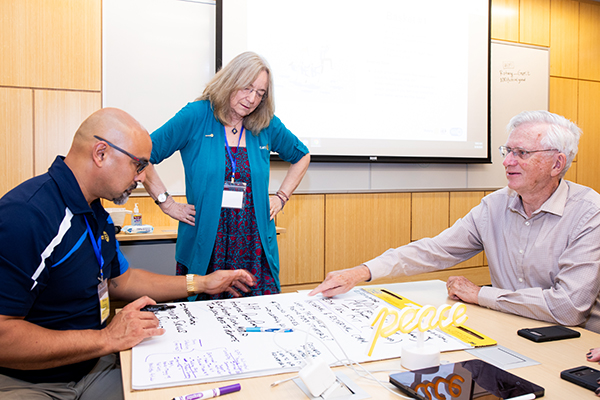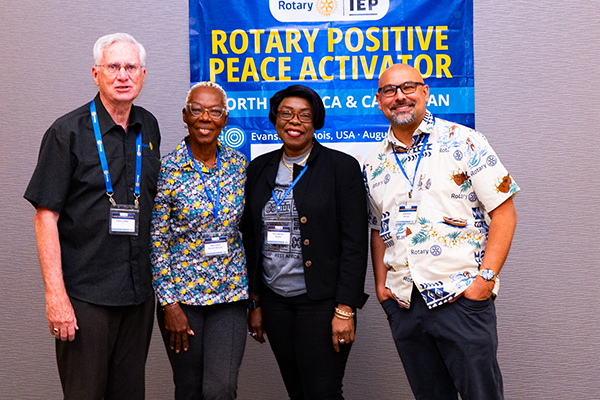
By Chris Offer, past district governor and member of the Rotary Club of Ladner, Delta, British Columbia, Canada
I was fortunate in August to be part of a group of 40 Rotary members and Rotary Peace Fellows to attend a seminar for Rotary Positive Peace Activators in Evanston, Illinois, USA.
Rotary Positive Peace Activators work to implement the principles of positive peace in their local communities and internationally. Their work is based in Rotary’s belief that sustainable peace is not just the absence of war but the presence of positive conditions that prevent conflict from arising.
Rotary Positive Peace Activators have been trained in every region around the globe. There are now more than three hundred activators. They collaborate with Rotary clubs, districts, and non-Rotary groups as trainers and as consultants on peace projects.
I am a retired police officer. I served over 30 years with the Vancouver Police Department in Canada. I discovered that there were three other retired police officers attending the course in Evanston. During the three days we swapped stories about our police careers, and we talked about what skills a police officer has that are relevant to our role as Rotary Positive Peace Activators.
The other police officers on the course were Oberlene Smith Whyte a Rotary Peace Fellow (Chulalongkorn 2023), who was a member of the Jamaica Constabulary Force. She served on three international peace missions with the United Nations in Darfur, Western Sudan, Namibia, and Liberia. Novelette Grant served the Jamaica Constabulary Force. She retired as Deputy Commissioner of Police. And Lawrence Horton served as a police officer with the City of Phoenix, Arizona, USA.

Rotary has been involved in peacebuilding for over a century. It started with our Fourth Object of Rotary and the idea of fostering goodwill and friendship among people from different countries and cultures. Rotary’s peace efforts have evolved over the years, expanding from local community projects to international peace initiatives. The establishment of the Rotary Peace Centers, which offer scholarships for advanced studies in peace and development, is a testament to Rotary’s commitment to global peace.
Our training in Evanston involved an in-depth understanding of the positive peace framework, including the eight pillars of positive peace developed by Rotary’s strategic partner the Institute for Economics and Peace. We debated strategies for implementing these concepts. Presentations focused on what tools we need to assess the strengths and challenges in our communities related to the pillars of positive peace and how to design and implement Rotary projects that address gaps and build on strengths.
De-escalation: critical skill for peace building
The four ex-cops concluded that police officers can contribute significantly to Rotary’s Positive Peace Activator program by leveraging their unique position in the community. We talked about how police officers partnering with Rotary can engage in community policing and build strong relationships with the community.
Lawrence Horton said that de-escalation is a critical police skill that is equally critical for peacebuilders. When tensions rise, skilled officers know how to dial it back. They are experts in de-escalation techniques – using empathy, calm words, and body language to defuse volatile situations. We all agreed that our experience in conflict resolution and mediation, helping to calm situations before they escalate or become violent, is a critical skill for peacebuilders.
Police can collaborate with Rotary clubs on community projects that address local issues such as poverty, inequality, or education. Working together with Rotary, police officers can help design and implement public safety campaigns that align with positive peace principles, such as promoting non-violence, assisting refugees to integrate into the community, or programs to assist the under housed.
All four of us agreed that police officers can contribute their expertise to Rotary-led workshops on positive peace. Police can discuss safety, legal rights, and community resilience. Their involvement can help ensure that these programs are practical and grounded in real-world experience. We discussed the value of Rotary partnering with the police to have access to factual data that can give Rotary and the groups we work with a realistic picture of crime in the community.
I believe that police departments can benefit from Rotary’s peacebuilding training, gaining new perspectives on how to integrate eight pillars of positive peace into their everyday work. By working with Rotary, police officers can help advocate for policies that support positive peace, such as reforms in the criminal justice system, community-based policing, and measures to reduce violence and inequality.
Empathy: not just a buzzword
Oberlene Smith Whyte and Novelette Grant both commented on the importance of understanding cultural nuances, whether it is language, customs, or traditions. Peacebuilders need to navigate these differences and build trust across diverse backgrounds. Rotary peace projects with immigrants and refugees in particular require an understanding of cultural differences.
My police and Rotary experience tell me that empathy is not just a buzzword; it is a core peacebuilding skill. Empathy plays a crucial role in community peacebuilding by increasing understanding, reducing conflict, and promoting collaboration. When people feel understood and their emotions acknowledged, they are more likely to trust.
The four of us have a combined total of more than 120 years of police experience that we now can use as Rotary Positive Peace Activators to team up with Rotary clubs and districts as consultants on peace projects or as presenters on positive peace at workshops, conferences, and other Rotary events.
Our advice is to engage your local police as partners to work on peace projects.
Learn more about Rotary Positive Peace Activators and how to connect with an Activator in your region. Take the free online Rotary Positive Peace Academy course to learn more about positive peace.
https://blog.rotary.org/2024/09/26/how-rotary-police-officers-can-collaborate-to-build-positive-peace/
